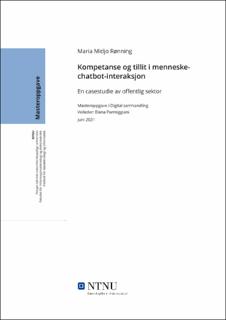| dc.description.abstract | Bruk av kunstig intelligens i offentlig tjenesteleveranse er stadig økende, og målet om å legge til rette for et digitalt førstevalg skal gjøre digital samhandling til normen for kontakt mellom innbygger og forvaltning. Flere offentlige aktører har tatt i bruk chatboter for innbyggerkontakt for å oppnå en høyere grad av selvbetjening, ressurssparing og økt tilgjengelighet. For å sikre utbredt akseptanse av chatboter er offentlig sektor avhengig av at brukere (innbyggere) har tillit til tjenesten. Tidligere forskning foreslår en rekke faktorer som påvirker utvikling av tillit i en menneske-chatbot interaksjon, deriblant oppfattet kompetanse. Mye av forskningen er derimot gjort på chatboter for kundeservice og i kommersiell sammenheng, og det er et gap i litteraturen om tillit til chatboter i offentlig sektor.
Denne studien har som mål å bidra med ny empirisk innsikt om hvordan kompetanse påvirker brukeres tillit til chatboter med følgende forskningsspørsmål: Hvordan påvirker oppfattet kompetansenivå tillit mellom bruker og chatbot? For å besvare forskningsspørsmålet er det gjennomført en casestudie på bruk av chatbot i offentlig sektor, eksemplifisert med NAVs chatbot, Frida. Datainnsamlingen består av intervjuer gjennomført med informanter hos NAV samt en spørreundersøkelse besvart av innbyggere som har benyttet seg av chatbot for kontakt med offentlig sektor i Norge.
Funnene viser at tillit i stor grad påvirkes av oppfattet kompetansenivå, og at brukeres forventninger før bruk spiller en viktig rolle i hvordan kompetanse oppfattes. Når brukere har høye forventninger til en chatbots kompetanse, innhold og evne til å forstå, og disse ikke innfris ved bruk, svekkes tilliten fort. Forventninger som i større grad stemmer overens med en chatbots reelle kompetansenivå fører til at tilliten forblir uendret ved bruk. Videre presenteres tiltak som kan legge til rette for tillit i en menneske-chatbot interaksjon. | |
| dc.description.abstract | The use of artificial intelligence in public service delivery is constantly increasing, and the goal of promoting a ''digitalt førstevalg'', or a digital first choice, makes digital interaction the norm for interaction between citizens and public administration. Several public agencies are using chatbots for citizen contact to facilitate a higher degree of self-service, increase accessibility, and save resources. In order to achieve a widespread acceptance of chatbots, the public sector is dependent on users (citizens) trusting the service. Previous research suggests several factors that influence the development of trust in a human-chatbot interaction, including perceived competence. Although much research has been done on chatbots in recent years, most of it is done on chatbots for customer service and in a commercial context, and there is a gap in the literature on trust in chatbots in the public sector.
This study aims to contribute new empirical insight into how competence affects users' trust in chatbots with the following research question: How does the perceived level of competence affect trust between user and chatbot? To answer the research question, a case study has been carried out on the use of chatbots in the public sector, exemplified by NAV's chatbot, Frida. The data collection consists of interviews conducted with informants from NAV as well as a survey answered by citizens who have used chatbots for contact with the public sector in Norway.
The findings show that trust is largely influenced by perceived level of competence and that users' expectations before use play an important part in how competence is perceived. When users have high expectations of a chatbot's competence, content, and ability to understand, and these expectations are not met during the interaction, the users' trust quickly weakens. Expectations that correspond to a chatbot's real level of competence lead to their expectations being met during the interaction, and the trust remains unchanged. Furthermore, measures that can facilitate trust in a human-chatbot interaction are presented. | |
